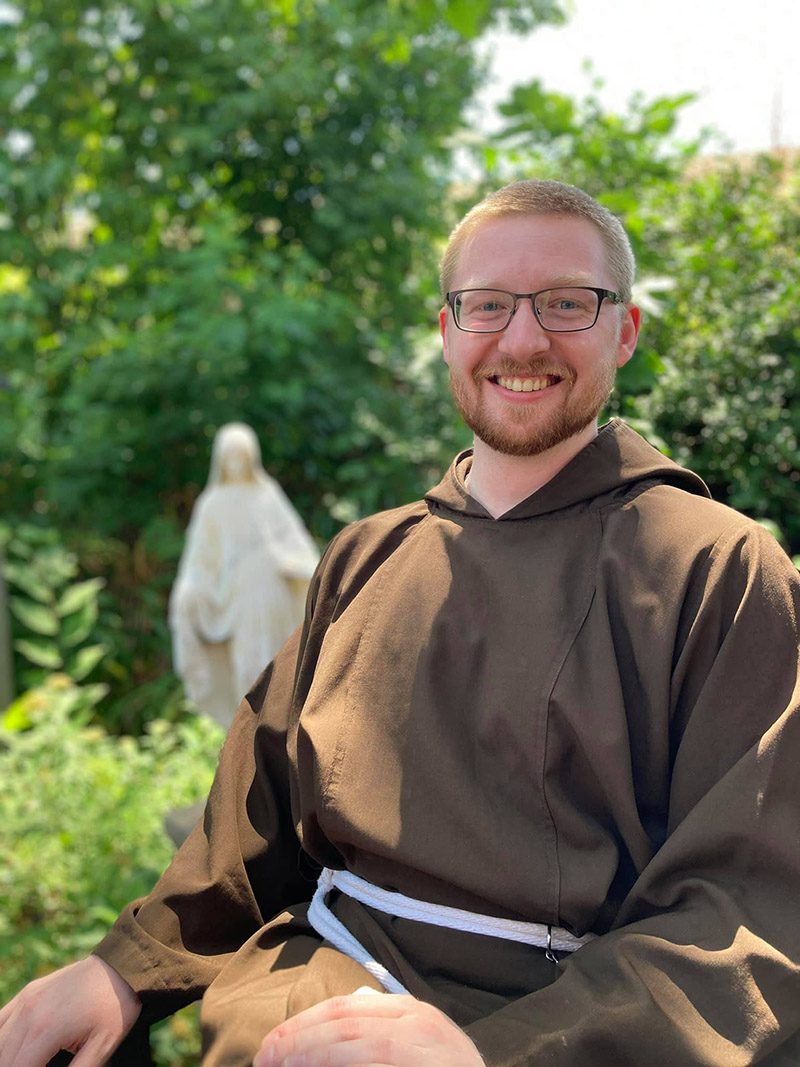
Br. Nathan Linton, native of Cumberland and son of Dcn. Steve and Mary Linton, professed his perpetual vows as a Capuchin Franciscan in Milwaukee on July 16 along with three other Capuchin friars. (Facebook Photo: Midwest Capuchin Friar Vocation Office)
This testimony was posted by the Midwest Capuchin Friar Vocation Office in mid-July. Capuchin Br. Nathan Linton professed his final vows of poverty, chastity and obedience last month.
Br. Nathan grew up in a small town in Northwest Wisconsin called Cumberland and faith had always been an important part of his family life growing up.
His mother was a cradle Catholic, the 13th of 14 kids, and his father had converted to Catholicism after marrying his mother. They were a typical Catholic family, going to Sunday Mass, going through religious education and receiving the sacraments, but for Br. Nathan, faith only began to take on a more personal meaning after his own discernment.
When he was in seventh grade, he noticed his father starting the process of becoming a permanent deacon in his diocese and seeing this, Br. Nathan started to ask himself a question, “If God’s calling him to something, does that mean God’s calling me to something?”
“I started taking my own life of faith more seriously,” said Br. Nathan, “I started doing research about what the Catholic faith really is, what it means, and why we believe what we believe and really started to be more attracted to it and take my own prayer life and faith life more seriously.”
“The idea of priesthood started to come up and I kind of went back and forth with that for a while,” said Br. Nathan. “Eventually, when I was a sophomore in high school, I contacted our vocations director for the diocese and did a visit to the seminary, which was very affirming.”
In order to discern his vocation, Brother Nathan decided that he would at least go to seminary after high school. “At that point, I had never met anyone religious before,” he recalled. “The idea of religious life was not at all in my consciousness.” But it was the end of his junior year and the guidance counselors had encouraged the students to write about the career they were planning to go into as well as a backup career that was similar but not too similar. “I wrote about priesthood as my primary career and then religious life as a backup.”
In that paper, Br. Nathan wrote about the Benedictines, the Dominicans, and the Capuchins. What impressed him about all of them was the vow of poverty which for him, took on the meaning of giving absolutely everything over to God. “In my mind, I said ‘if I’m going to do this, that’s what I want to do, I don’t want to hold anything back. I want to give all of myself, everything I have to God and completely trust in him.’ So I started to look more seriously at religious life and saw the Capuchins’ emphasis on a life of simplicity and poverty and service to the poor, and that’s what began to attract me.”
After high school, Br. Nathan entered a college program that the Capuchins had. He studied for a year at St. Joseph’s College Seminary and Louisville University, but during that time he still had questions in the back of his head about what it would have been like if he had joined a diocese.
“At the end of that year, I left the college program for the Capuchins and did a year of seminary for my diocese, which was a wonderful experience. It was a very important year, especially in the deepening of my own life of prayer through the prayer structure of St. John Vianney and St. Paul. It was during that time where I was enjoying the brotherhood that I experienced at the seminary that I realized that it was a temporary thing, but it was something that gave me joy and something I really appreciated and that nourished my life.”
He began to miss the life of brotherhood that he had experienced while he was with the Capuchins and started thinking about returning, realizing that the idea of brotherhood was an important part of his journey. At the end of that year, he spoke with his vocations director and eventually made the decision to enter postulancy.
“I’ve continued in formation since,” said Br. Nathan, “I would describe what happened as a deepening of my own understanding of who we are and what our life means, our life together as brothers and friars.”
